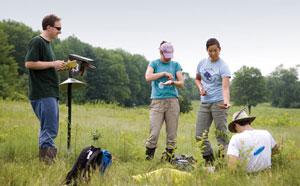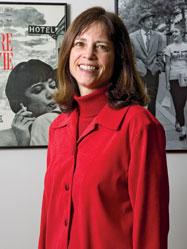By Katherine Duke '05
J.P. Baird, assistant professor of psychology in the neuroscience program, received a $237,000 grant from the National Institutes of Health last winter to fund three years of research into the effects of certain neuropeptides on the eating habits of laboratory rats. The work could help scientists better understand eating disorders in humans.
The Stray Dog Cabaret, a collection of Russian modernist poems translated by Paul Schmidt and edited by Professor
of Russian Catherine Ciepiela ’83 and Honor Moore, was a finalist for the PEN Award for Poetry in Translation. Also, Ciepiela’s book The Same Solitude was named both an Outstanding Academic Title by the American Library Association’s Choice magazine and a Best Book of Slavic Literary/Cultural Criticism by the American Association of Teachers of Slavic and East European Languages.
 Associate Professor of Biology Ethan Clotfelter (left) and his |
Associate Professor of Biology Ethan Clotfelter and his student research assistants have discovered that heating the nests of tree swallows results in healthier mother and baby birds. The findings were published in Biology Letters and the Journal of Animal Ecology. Also, Clotfelter received a $244,000 National Science Foundation grant last year to study the effects of phytoestrogen contamination on fish.
With an Alfred P. Sloan Foundation grant, Playwright-in-Residence Constance Congdon has been researching the water shortage in the American West, about which she is writing a new play. This year, Congdon also saw her version of Moliere’s Tartuffe published by W.W. Norton & Co.
Professor of Geology Peter D. Crowley spoke in Denver last year at the annual meeting of the Geological Society of America. He lectured on his use of the electron-backscattering diffraction method to study the metamorphism and deformation of limestone in the Wallowa Terrane in the Blue Mountain region of the Pacific Northwest.
Lawrence Douglas, the James J. Grosfeld Professor of Law, Jurisprudence and Social Thought; Austin Sarat, the William Nelson Cromwell Professor of Political Science and Jurisprudence; and Martha Merrill Umphrey, professor of law, jurisprudence and social thought, edited the essay collection Law and Catastrophe. Sarat also co-edited the essay collection Trauma and Memory and received an honorary doctorate of laws from his alma mater, Providence (R.I.) College, last May.
Last spring, Assistant Professor of Music Jeffers Engelhardt and the Five College Ethnomusicologists hosted the annual meeting of the Northeast Chapter of the Society for Ethnomusicology. The meeting featured shape-note singing by Tim Eriksen ’88.
Judith Frank, professor of English and creative writing, received a $25,000 National Endowment for the Arts 2008 Literature Fellowship. She is using it to complete her novel Noah’s Ark.
In August, the journal Nature put together a list of the most influential discoveries in the history of spin physics. Number 22 on that list was a 1996 discovery by Associate Professor of Physics Jonathan Friedman and his team: the first definitive proof that a magnet can reverse its direction by “tunneling” directly through an energy barrier rather than by overcoming the barrier. (See My Life, page 38.)
Stephen George, the Manwell Family Professor of Life Sciences, is faculty manager of a grant awarded to the college by the Howard Hughes Medical Institute. The $1.3 million will go toward student research fellowships; a new faculty position in molecular neuroscience; increased collaboration with Mount Holyoke, Smith and Hampshire colleges; and other initiatives in science education.
 |
In the past year, Susan Niditch, the Samuel Green Professor of Religion, published Judges: A Commentary and “My Brother Esau Is a Hairy Man”: Hair and Identity in Ancient Israel, which addresses the significance of hair in the stories of Jacob and Esau, Samson and Delilah and other figures.
Professor of English Andrew Parker co-edited last year’s “After Sex: On Writing Since Queer Theory,” a special, book-length issue of South Atlantic Quarterly.
Karen Rosenak, the Valentine Visiting Professor of Music; Tison Street, former Valentine Visiting Professor of Music; and Associate Professor of Music David Schneider presented a concert for piano, violin and clarinet in Buckley Recital Hall last spring. They performed trios by Darius Milhaud and Galina Ustvolskaya as well as an original composition by Street.
Karen Sánchez-Eppler, professor of American studies and English, and Martha Saxton, professor of history and women’s and gender studies and the Elizabeth W. Bruss Reader, are among the founding editors of The Journal of the History of Childhood and Youth, a new, peer-reviewed quarterly.
Our American Cousin, an opera about the assassination of Abraham Lincoln with a score by Associate Professor of Music Eric Sawyer, premiered at the Academy of Music in Northampton, Mass., in June. Later in the summer, Sawyer’s piano trio “Lincoln’s Two Americas” won a Lincoln-themed composition contest sponsored by the Ravinia Festival.
In August, Adam Sitze, assistant professor of law, jurisprudence and social thought, received an International and Area Studies Fellowship from the American Council of Learned Societies, the Social Science Research Council and the National Endowment for the Humanities. The fellowship will enable Sitze to complete his book on South Africa’s Truth and Reconciliation Commission.
Susan Snively read selections from her four books of poetry at a reception held on campus in May on the occasion of her retirement from the positions of director of the Writing Center and associate dean of students.
In the spring, the Double Edge Theater in Ashfield, Mass., performed a play based on “The Disappearance,” a short story by Ilán Stavans, Lewis-Sebring Professor of Latin American and Latino Culture and Five College 40th Anniversary Professor. Over the past year, Stavans also published Love and Language and edited An Organizer’s Tale.
For the Max and Etta Lazerowitz Lecture on campus in April, Associate Professor of Spanish Lucia M. Suárez read “Ruins of Cuba: Memories of Havana,” a section of her book in progress, Looking for Cuba: Imagining a Nation, about Cubans living in worldwide diasporas.
In 2009, William Taubman, Bertrand Snell Professor of Political Science, begins his term as president of the American Association for the Advancement of Slavic Studies.
Top photo by Samuel Masinter '04; bottom photo by Charles Quigg '09.